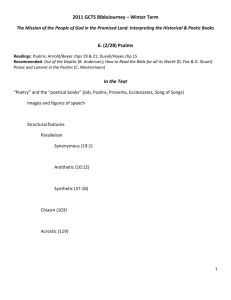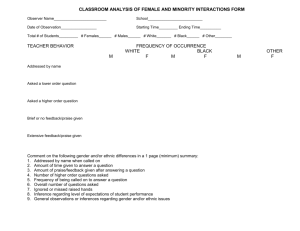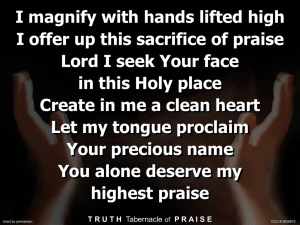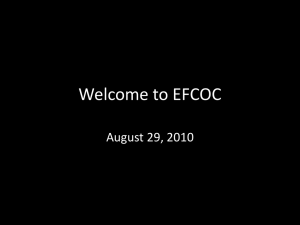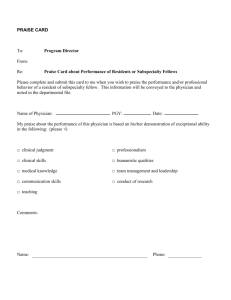Lesson 10: The Psalms of Praise
advertisement
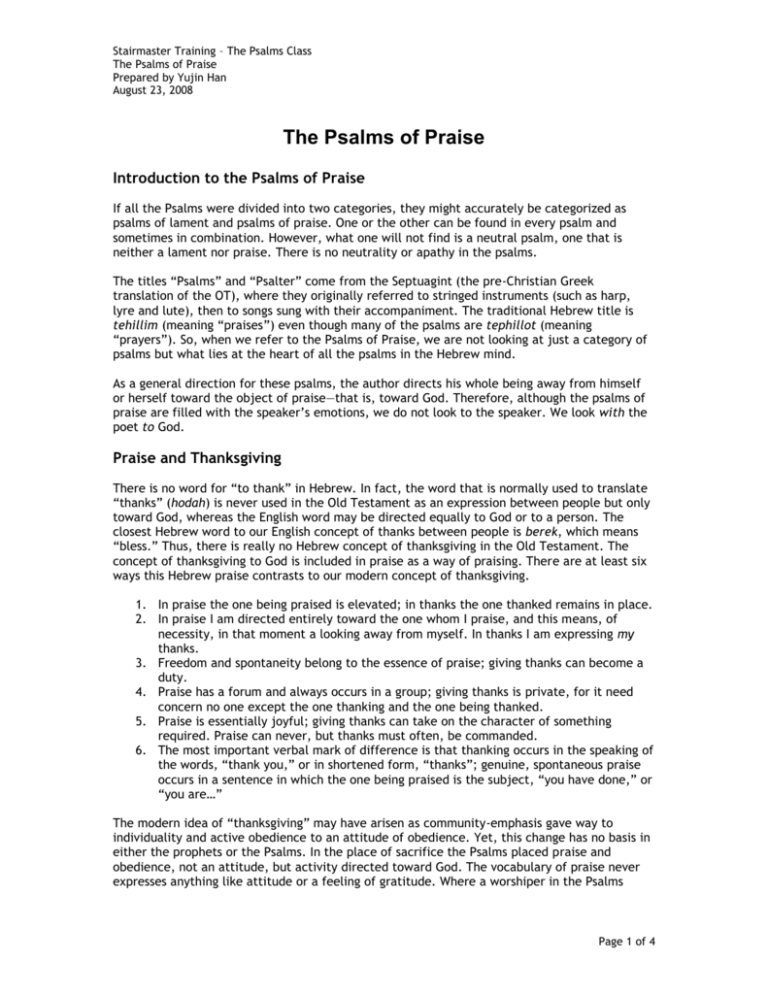
Stairmaster Training – The Psalms Class The Psalms of Praise Prepared by Yujin Han August 23, 2008 The Psalms of Praise Introduction to the Psalms of Praise If all the Psalms were divided into two categories, they might accurately be categorized as psalms of lament and psalms of praise. One or the other can be found in every psalm and sometimes in combination. However, what one will not find is a neutral psalm, one that is neither a lament nor praise. There is no neutrality or apathy in the psalms. The titles “Psalms” and “Psalter” come from the Septuagint (the pre-Christian Greek translation of the OT), where they originally referred to stringed instruments (such as harp, lyre and lute), then to songs sung with their accompaniment. The traditional Hebrew title is tehillim (meaning “praises”) even though many of the psalms are tephillot (meaning “prayers”). So, when we refer to the Psalms of Praise, we are not looking at just a category of psalms but what lies at the heart of all the psalms in the Hebrew mind. As a general direction for these psalms, the author directs his whole being away from himself or herself toward the object of praise—that is, toward God. Therefore, although the psalms of praise are filled with the speaker’s emotions, we do not look to the speaker. We look with the poet to God. Praise and Thanksgiving There is no word for “to thank” in Hebrew. In fact, the word that is normally used to translate “thanks” (hodah) is never used in the Old Testament as an expression between people but only toward God, whereas the English word may be directed equally to God or to a person. The closest Hebrew word to our English concept of thanks between people is berek, which means “bless.” Thus, there is really no Hebrew concept of thanksgiving in the Old Testament. The concept of thanksgiving to God is included in praise as a way of praising. There are at least six ways this Hebrew praise contrasts to our modern concept of thanksgiving. 1. In praise the one being praised is elevated; in thanks the one thanked remains in place. 2. In praise I am directed entirely toward the one whom I praise, and this means, of necessity, in that moment a looking away from myself. In thanks I am expressing my thanks. 3. Freedom and spontaneity belong to the essence of praise; giving thanks can become a duty. 4. Praise has a forum and always occurs in a group; giving thanks is private, for it need concern no one except the one thanking and the one being thanked. 5. Praise is essentially joyful; giving thanks can take on the character of something required. Praise can never, but thanks must often, be commanded. 6. The most important verbal mark of difference is that thanking occurs in the speaking of the words, “thank you,” or in shortened form, “thanks”; genuine, spontaneous praise occurs in a sentence in which the one being praised is the subject, “you have done,” or “you are…” The modern idea of “thanksgiving” may have arisen as community-emphasis gave way to individuality and active obedience to an attitude of obedience. Yet, this change has no basis in either the prophets or the Psalms. In the place of sacrifice the Psalms placed praise and obedience, not an attitude, but activity directed toward God. The vocabulary of praise never expresses anything like attitude or a feeling of gratitude. Where a worshiper in the Psalms Page 1 of 4 Stairmaster Training – The Psalms Class The Psalms of Praise Prepared by Yujin Han August 23, 2008 says, “I will praise the Lord…,” they do not mean, “I will be thankful to God,” but, “I will respond to him for what he has done for me.” Thanks as a thankful attitude that is not expressed is unknown in the Old Testament. Furthermore, in the vocabulary of thanks man remains subject, while in the sentences of praise, God is subject: “You have done… you are… God is… “So, when we encounter verses, such as Psalm 118:1, “O Give thanks to the LORD, for he is good; his steadfast love endures forever!” we must be careful. If we understand this verse as teaching that I should thank God because of his goodness and enduring love, then we would be reading this verse in the wrong way. It is subtle but dangerously significant. With the hodu (translated here as “give thanks”) we are not called to a sentence in which I am the subject, but to one in which God is the subject. The former way of understanding has certainly misled countless into a religion that teaches the follower to worship God for his benefits. The correct way teaches properly that God is to be worshipped period; that is, because He is God, not because he did X for me or Y for me. X and Y, therefore, form not the reason but the content of our praise. Two Types of Praise Psalms: Declarative and Descriptive Praise Declarative praise is praise in the context of a specific act of God on behalf of the psalmist. Descriptive praise is praise for the general attributes and activities of God. Examples of declarative praises are Psalms 18, 21, 30, 32, 34, 40, 41, 66, 106, 116, and 138. These might be further divided into declarative praises by the individual and declarative praises by the community. Example of individual praise: Psalm 30:1-3 1 I will exalt you, O LORD, for you lifted me out of the depths and did not let my enemies gloat over me. 2 O LORD my God, I called to you for help and you healed me. 3 O LORD, you brought me up from the grave; you spared me from going down into the pit. Example of community praise: Psalm 124:1-3 “Had it not been the Lord who was on our side” Let Israel say, “Had it not been the Lord who was on our side, when men rose up against us; Then they would have swallowed us alive, When their anger was kindled against us…” Examples of descriptive praises are Psalms 28, 33, 36, 105, 111, 113, 117, 135, 136, 146, and 147. Many of these psalms begin and end with the expression of praise Hallelu Yah! (Hallelujah), which means literally “Praise the LORD!” Generally, either God’s greatness in creation or His grace in salvation history is extolled in these psalms. When God’s actions are described, they are frequently used to detail aspects of God’s character, which are then praised by the psalmist. Page 2 of 4 Stairmaster Training – The Psalms Class The Psalms of Praise Prepared by Yujin Han August 23, 2008 Example of Descriptive Praise: Psalm 136 1 Give thanks to the LORD, for he is good. His love endures forever. 2 Give thanks to the God of gods. His love endures forever. 3 Give thanks to the Lord of lords: His love endures forever. 4 to him who alone does great wonders, His love endures forever. 5 who by his understanding made the heavens, His love endures forever. 6 who spread out the earth upon the waters, His love endures forever. 7 who made the great lights— His love endures forever. 8 the sun to govern the day, His love endures forever. 9 the moon and stars to govern the night; His love endures forever. 10 to him who struck down the firstborn of Egypt His love endures forever. 11 and brought Israel out from among them His love endures forever. 12 with a mighty hand and outstretched arm; His love endures forever. 13 to him who divided the Red Sea [a] asunder His love endures forever. 14 and brought Israel through the midst of it, His love endures forever. 15 but swept Pharaoh and his army into the Red Sea; His love endures forever. 16 to him who led his people through the desert, His love endures forever. 17 who struck down great kings, His love endures forever. 18 and killed mighty kings— His love endures forever. 19 Sihon king of the Amorites His love endures forever. 20 and Og king of Bashan— His love endures forever. 21 and gave their land as an inheritance, His love endures forever. 22 an inheritance to his servant Israel; His love endures forever. 23 to the One who remembered us in our low estate His love endures forever. 24 and freed us from our enemies, His love endures forever. Page 3 of 4 Stairmaster Training – The Psalms Class The Psalms of Praise Prepared by Yujin Han August 23, 2008 25 and who gives food to every creature. His love endures forever. 26 Give thanks to the God of heaven. His love endures forever. Psalms of Praise in the New Testament The Psalms are often quoted in the New Testament. In fact, it is quoted more than any other book (116 times from the 216 times the Old Testament is quoted in the New). Even when not directly quoting the Psalms, the apostles and evangelists were often influenced by them in the expressions they used. Consider the following New Testament doxologies (expressions of praise): "Now to the King eternal, immortal, invisible, the only God, be honor and glory for ever and ever. Amen" (1 Timothy 1:17). "For from him [God] and through him and to him are all things. To him be the glory forever! Amen" (Romans 11:36). "To the only wise God be glory forever through Jesus Christ! Amen" (Romans 16:27). "To him [Jesus Christ] be glory both now and forever! Amen" (2 Peter 3:18). "To the only God our Savior be glory, majesty, power and authority, through Jesus Christ our Lord, before all ages, now and forevermore! Amen" (Jude 25). "To him who sits on the throne and to the Lamb [Jesus Christ] be praise and honor and glory and power, for ever and ever!" (Revelation 5:13). Paul encourages the use of the Psalms in the early church: “Let the word of Christ dwell in you richly as you teach and admonish one another with all wisdom, and as you sing psalms, hymns and spiritual songs with gratitude in your hearts to God.” Page 4 of 4
